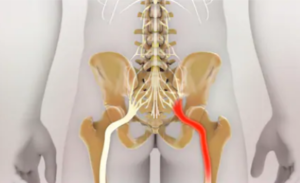
A spine doctor explains about medications for the pain of sciatic nerve pressure.
Sciatic nerve impingement can be caused by a herniated disc or a spasming piriformis muscle.
Either way, the pain has been described as “excruciating” by many patients.
It can come on suddenly, seemingly for no apparent reason, no known trigger.
Best medications for sciatic impingement pain?
“Medications in the classes of aspirin, non-steroidal anti-inflammatories, muscle relaxants, oral steroids, antidepressants and narcotics could be recommended to suppress the pain of symptomatic sciatic nerve,” says spinal and orthopedic surgeon Kenneth K. Hansraj, MD, who specializes in minimally invasive spine surgery, laminectomies and spinal fusions, and is author of the book, “Keys to an Amazing Life: Secrets of the Cervical Spine.”
He adds, “Each physician seems to have their own recipe for diminishing inflammation and calming the sciatic nerve.”
Why don’t prescription narcotics work (e.g., two Percocets)?
“Prescription narcotics may not work after a while when the patient develops a tolerance to the medication,” says Dr. Hansraj.
Oral steroid medications are often recommended as a pain reliever for people with sciatic pain, but at the same time, these can be taken only short-term.
“Long-term use of oral steroids may lead to increased blood sugar, osteoporosis, cataracts, muscular weakness and avascular necrosis (loss of blood supply leading to damage of the joints) of major joints including the hips and knees,” points out Dr. Hansraj.
But what if you absolutely cannot have surgery for your herniated disc?
For example, a person with a very bad heart may be a poor candidate for surgery simply because of the anesthesia.
“I have taken care of patients who have medical problems and comorbidities which will never allow them to have spinal surgery,” says Dr. Hansraj.
“Usually these patients are handled with continued conservative options.”
For sciatica these include heat and cold therapy, special chairs, physical therapy and of course, medications such as NSAIDs and antidepressants like Cymbalta.












